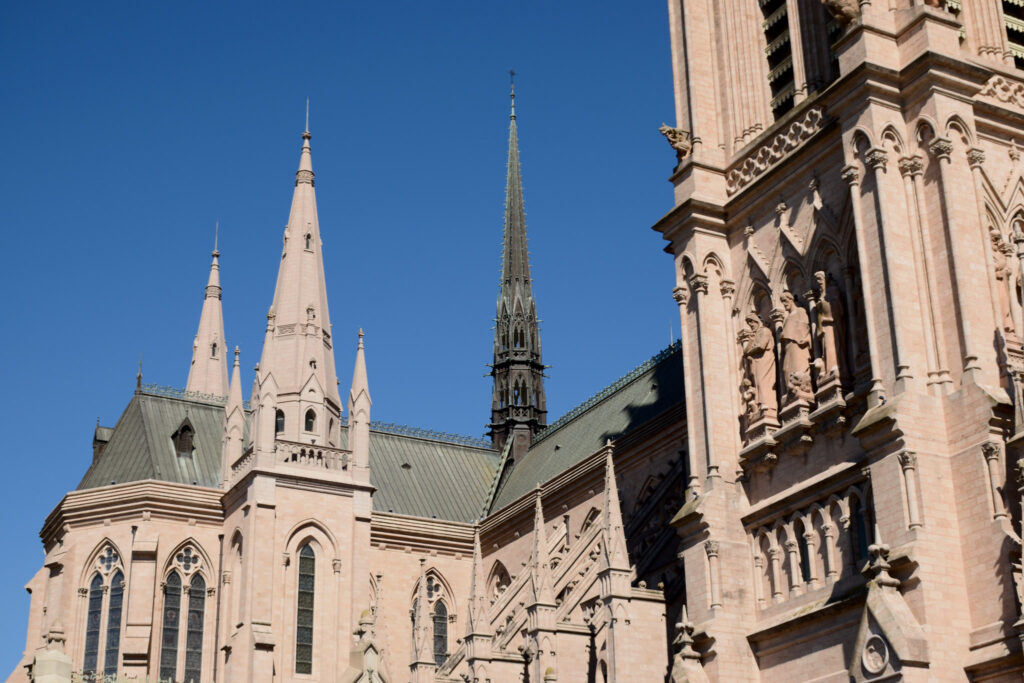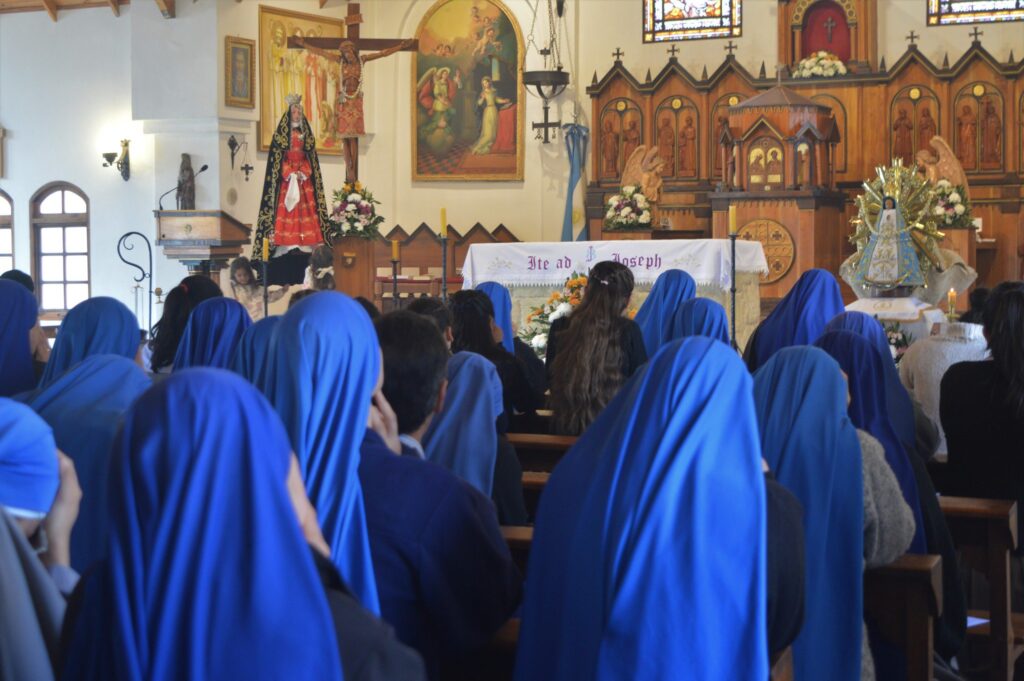Freedom of religion is a constitutional right in Argentina. Daily reality supports this right, especially in Buenos Aires, where the various faiths coexist peacefully, without conflict or impositions of any kind.
Many foreigners wonder which faiths have the greatest number of believers in Buenos Aires and whether all religions can be practiced in the capital of Argentina.
In this article, we will explore which are the most important faiths in Buenos Aires and why the city is friendly to the peaceful coexistence of each religion.
| Religion | +/- | 2019 | 2008 |
|---|---|---|---|
| Total | — | 100% | 100% |
| Christianity | ▼ 8.0% | 79.6% | 87.6% |
| Catholicism | ▼ 13.6% | 62.9% | 76.5% |
| Pentecostalism | ▲ 5.1% | 13.0% | 7.9% |
| Other Evangelicals | ▲ 1.2% | 2.3% | 1.1% |
| Jehovah’s Witnesses | ▼ 0.7% | 1.4% | 1.2% |
| Mormonism | ▼ 0.1% | 0.8% | 0.9% |
| Irreligion | ▲ 7.6% | 18.9% | 11.3% |
| Indifferent | — | 9.7% | — |
| Atheism | — | 6.0% | — |
| Agnosticism | — | 3.2% | — |
| Other Religions | — | 1.2% | 1.2% |
| Don’t know | — | 0.3% | — |
Freedom of Worship in the Argentine National Constitution
Since the first draft of the Argentine National Constitution in 1853, freedom of worship and the recognition of religion as a right have been enshrined in the preamble, Article 14, and Article 20.
Article 14 guarantees freedom of worship, while also highlighting that the Argentine State grants the Catholic Church a preferential status, giving it a distinct legal recognition compared to other faiths.
Article 14 – All inhabitants of the Nation enjoy the following rights in accordance with the laws that regulate their exercise; […] to freely profess their faith.
Although Article 2 of the Constitution mandates that the National State supports the Roman Catholic Apostolic Church, Catholicism is not the official religion of Argentina.
Article 2 – The federal government supports the Roman Catholic Apostolic faith.
Until 1994, presidents of the nation were required to be Catholic, a requirement eliminated in the last constitutional reform.
Freedom of worship is also guaranteed to foreigners residing in Argentina.
Article 20 – Foreigners enjoy in the territory of the Nation all the civil rights of citizens; […] to freely exercise their religion.
What Are the Main Religions in Buenos Aires?
While the latest census does not yet provide definitive figures, various academic studies have sought to measure the influence of different faiths in Argentine society, particularly which religions have the most adherents and what proportion of the population does not profess any faith.
In the City of Buenos Aires, 77.5% of the population claims to believe in God, a figure that rises to 89.6% in the Province of Buenos Aires.
Catholicism is the most significant religious group, with 68.7% of believers in the City of Buenos Aires. Interestingly, non-believers (those who do not adhere to any religion) follow at 22.9%, and non-Catholic Christians (mostly Pentecostals) make up 6.8% of the population.
Buenos Aires is also home to one of the largest Jewish communities (over 200,000 people), and the Muslim population in the city is estimated at around 160,000.

Places of Worship in Buenos Aires
The dominance of Catholicism is also evident in the number of places of worship in Buenos Aires. There are an estimated 300 Catholic temples in the city, followed by neo-Pentecostal, Protestant, Pentecostal, Jewish, and other non-Catholic Christian temples.
How Common is Attendance at Religious Services in Buenos Aires?
In Buenos Aires, more than half of the population never attends religious services (such as mass or other celebrations). Of the 48% who do attend, 23% do so annually, 10% monthly, and 16% weekly.
When examining attendance at religious services by different groups of believers, non-Catholic Christians are the most frequent participants (80.3%). Among Catholics, this figure drops to 58.4%, and for other faiths, it decreases further to 50%.
Has the Number of Religious People Increased or Decreased in Buenos Aires Over Time?
Statistics indicate that the number of non-believers has risen from 10% to 30% between 1995 and 2017.
The question is which faith (or group of faiths) has seen a decline due to this increase in non-believers. In the case of Catholicism, the number of people identifying as Catholic has decreased, dropping from 70% to 60% during the same period.
Is Buenos Aires a peaceful place to freely practice any religion?
Of course it is. With the exception of isolated events that have been linked mostly to political conflicts, although this does not diminish their seriousness (attacks against the AMIA and the Israeli Embassy in the 1990s), Buenos Aires is a peaceful place to profess any type of faith.
For this reason, many people from abroad who decide to flee religious persecution in their native countries choose Argentina, and Buenos Aires in particular, as a place to practice their religion without being subjected to judgment or discrimination.

What are the popular saints in Buenos Aires?
Popular saints are figures of Argentine culture who enjoy the credibility of broad sectors of society. They are the subject of testimonies about miracles, healings and mystical apparitions, which are not always recognized or endorsed by the Catholic Church. In cases where there is endorsement by the Church, whether for miracles or healings that science cannot explain, the process includes beatification and canonization by the Vatican.
Among the popular saints with the most support in Argentine society are Gauchito Gil, Difunta Correa, Pancho Sierra, Ceferino Namuncurá and various apparitions of the Virgin which are reported in the provinces and cities of Argentina.
(Featured Image Source: Gianna B/unsplash.com)


